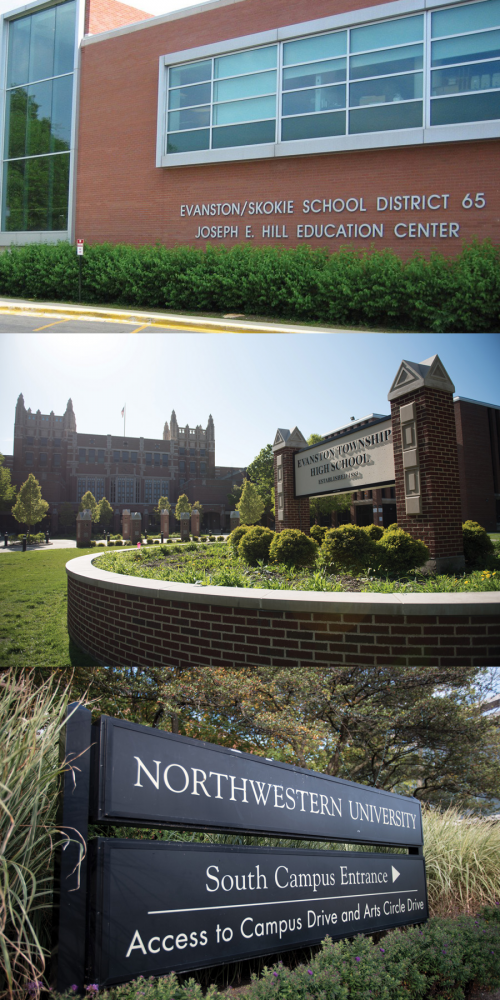Northwestern, Evanston school districts to kick off education partnership
(Top: Patrick Svitek, Middle: Allie Goulding, Bottom: Colin Boyle)
Evanston/Skokie School District 65 (top), Evanston Township High School (middle) and a sign for Northwestern (bottom). A joint project between the three entities will identify factors that determine college readiness.
September 19, 2017
After four years of discussion about improving the success of Evanston students in postsecondary education, a Northwestern partnership with local school districts is beginning its first project.
The initial project will focus on identifying characteristics of college readiness, as part of the partnership’s larger goal of better connecting NU and Evanston school districts, SESP Dean David Figlio said.
“Our ideals with this collaboration are to have Northwestern and Evanston schools become real strong, true partners aimed at having the breakthroughs that are going to improve educational outcomes for kids currently in school and kids who aren’t even born yet,” said Figlio, who helped develop the partnership.
Figlio said the research is still getting “up and running,” but the pilot project is the “Evanston-specific on-track indicator.” This research initiative aims to identify the stages in development through school that can predict success in college, he said.
Once the predictive factors are identified, schools can start to determine which students are on track and which ones need additional resources to ensure success, Figlio said.
Evanston/Skokie School District 65 board member Candance Chow said educators should begin watching for indicators of college readiness as far back as kindergarten.
“The most critical thing we’ve been talking about is really having a line of sight from right to left,” Chow said. “So being able to … understand at least at some level, what does that mean in earlier grades?”
Pete Bavis, assistant superintendent of curriculum and instruction at Evanston School District 202, said with the research partnership — officially known as the Northwestern-Evanston Education Research Alliance — comes a data-sharing agreement between the three entities.
The agreement enables district administrators to work with NU researchers on addressing questions about policy and programming, Bavis said.
He said the alliance also uses data from National Student Clearinghouse, which collects information from colleges and universities that regularly report enrollment and degree information, according to its website. Bavis said this data will help to label some of the factors that lead to a student’s collegiate success — like academic performance, class schedule, attendance and disciplinary record.
“There’s a real way to take theory, take big data and apply it to help increase students’ trajectories in Evanston,” Bavis said. “We think it can be a real game changer for how we support kids and how we talk to kids and nurture them on their path.”
Bavis said District 202 has “enhanced” its analytic team, since it will be crucial for identifying problems the administrators can address.
Though no analyses have been conducted yet, the program has already received funding from the Lewis-Sebring Family Foundation, Spencer Foundation and contributions from the School of Education and Social Policy, Figlio said.
Figlio said though it is ultimately up to district administrators to decide how they want to utilize the project’s final data, NU will remain a part of the process.
“I fully anticipate that Northwestern researchers will be at the table helping to think about what those programs will look like and helping to set them up for evaluation,” Figlio said.
Rishika Dugyala contributed reporting.
Email: [email protected]
Twitter: @amelialangas


